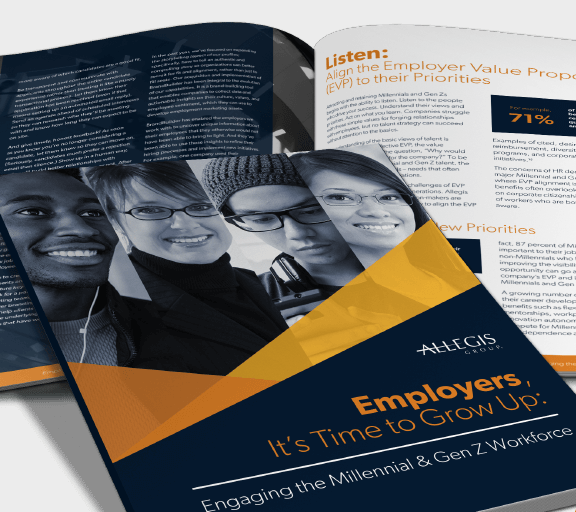Millennials: The Oft-Maligned Generation that Will Save Us All

Andy Hilger, President, Allegis Group
Everywhere I look, someone is weighing in on “the Millennial problem.” Some decry them as a “lazy, entitled, screen-obsessed generation” while others struggle with how to manage their growing numbers – and elevated status – in the workplace. Two main schools of thought have emerged:
- Understand their true motivations and modify your message to inspire their greatness within, or
- Recognize that we messed them up with our everyone-gets-a-trophy, helicopter-parenting, and that we must help them rise above their unfortunate circumstances to realize their true potential.
If we're not careful, either message can come off as a nice way of saying, "Hey, kids, get off of my lawn!" I’ve asked some Millennials what it feels like to be a Millennial. (I know. It’s like asking a fish what it’s like to be wet.) They didn't answer as much as they reacted. They reacted strongly, screwing up their faces and expressing disdain. They hated the label. They don’t want to be viewed as Millennials because the label has taken on such a negative connotation.
Allegis Group hires thousands of Millennials every year, and we challenge them to lead. We expect everyone to care for one another and many take on formal leadership roles a year or two after joining. We have always been passionate about creating opportunity, and we fulfill our mission when our newest team members thrive. Often they do, but sometimes they don't. It would be easy to blame the Millennials, but the easy answer is often not the right answer. So, we spend a lot of time engaging this demographic. We conduct surveys, host roundtables, collaborate on social media, and study the research. Our success depends on this "lazy, entitled, screen-obsessed generation."
And over the years, we've seen a lot of success. At its roots, that success has come from the opposite of lazy and entitled. We care about ownership and accountability and hard work and deep relationships, and we believe they are the foundation of our success. That's not for everyone, and we are constantly asking ourselves what should never change and what needs to evolve. We're obsessed with understanding how we can get better at attracting the right talent and how we can get better with onboarding. We're really obsessed with how we can accelerate the success our teammates experience. Hence, all the energy spent on "the Millennial problem."
Here's my conclusion. We don't have a "Millennial problem" at all. The teams I interact with are excited, switched-on, and passionate about doing great work. They care about each other and crave fulfillment. I like to think that we do a good job of finding great people, so maybe the sample is a little skewed, but maybe we need to frame the "problem" a little differently. Maybe we need to frame the problem as more of an opportunity.
Millennials (and soon-to-be Gen Zs) have an opportunity to transform our world. And we need them to. We see increased polarization and anger. More and more people feel like they have less and less of a voice. We face catastrophic challenges, and we're watching fear and anger dominate the emotional landscape. While we have many well-meaning (we hope) politicians fighting the fight, budget shifts and policy changes alone will not be enough. We need a major shift in mindset.
We don't have a crisis of policy. We have a crisis of leadership.
Enter the Millennials. Here's what I've come to know and believe:
- They listen, and they have empathy. While these might not be top-of-mind when most people think of leadership, they are some of the most critical skills. The days of top-down, hierarchical, autocratic leadership are over, and while command skills and assertiveness are important, to bridge the social and political divides, we need people who can build trust and engage differently. And that's what I've seen from Millennials.
- They want experiences more than stuff. Maybe it's their student loan debt, or maybe it's growing up in a sharing economy where their music lives in a cloud, but Millennials seem to want different things. When I was in high school, bumper stickers read, "Whoever Dies with the Most Toys Wins." That's translated into bigger houses and longer commutes and resulting environmental challenges. The Millennials have plenty of ambition; it just shows up in their desire to experience life, not own it. And that will be great for our planet (as well as their fulfillment). I don't think it's overstated to say that we need this attitude shift to save the world.
- They get the importance of fulfillment at work. I'm always amazed by the data related to job satisfaction. I get that people aren't supposed to like their job, and so they either trade time for money or, worse, are actively disengaged. Some of this comes from a manufacturing-era mindset about work, and for all the good that Henry Ford did to build a middle-class, his assembly-line thinking has informed how we think about our human capital (even that very phrase sounds dehumanizing). We overuse carrots and sticks and struggle to ensure that purpose, autonomy, and mastery (as Dan Pink's “Drive” posits) are the real keys to fulfillment. Millennials expect more than a paycheck. They want a voice, and they want to be part of a larger purpose. I just read that 12 percent of people have a best friend at work. That's crazy. Despite what you read or hear, the Millennials I know develop meaningful relationships. Imagine a world where most people liked their job and felt some level of fulfillment. That's what the Millennials imagine. And if you imagine it, you can do it.
- They are generous and want to give of their time and their money. Many of our current problems relate to the widening gap between haves and have-nots. While we close in on economists’ definition of full employment, we have many who have left the labor force. Both urban and rural areas face significant issues with addiction and violence. These are no longer complicated problems to solve, but complex systems to manage. And while we can look to education and healthcare and social safety programs, I believe that attitudinal shifts and a different critical consciousness will be more instrumental in moving the needle. Millennials think this way. Maybe it's their empathy; maybe it's their overt need for purpose, but this group cares, and this group engages. We need daily, local action, and the Millennials I meet inspire me every day.
- They get technology … and network effects … and their transformative power. A lot of what I've celebrated above depends on cultural and mindset shifts. Often, these happen as the result of black swan events (world wars, 9/11, the Great Depression) or glacial, generational shifts. We don't have time to wait. Here's the scary, but good news. Change will never be as slow as it is today. Millennials know how to start a movement, and they know how to leverage technology and platforms to watch that movement spread. Some people decry this reality as a sign that we now collect friends and likes and develop superficial relationships. We do live in a digital era, and there's a reality to the chemical need to have your Instagram photo liked. But let's face it. The Greatest Generation wasn't known for sharing feelings, and everyone worried that my generation would be defined by the movie “Wall Street.” I see tremendous power in building networks and shifting ideas, and I don't see this as mutually exclusive to developing deep and meaningful relationships.
- They know they can do it. There's an old saying that whether you think you can or you think you can't, you'll be right. I believe that stories have the power to change the world. They're how we communicate values and how we assign meaning. Call it the Harry Potter-effect, but Millennials grew up reading about the hero's journey and, maybe it's precisely because they've gotten so many trophies, they believe they can be the hero of their own story. It doesn't mean we don't need to build resilience and help them deal with failure, but a cynic has never changed the world. They think they can, and I think they’re right.
Here's the deal: while we live in a world of abundance, we also have some major problems that don't seem to be getting better. If anything, they are driving a wedge between us. We need the Millennials (apologies for using that derogatory term) to save us. Maybe, just maybe, we need to change the way we think about Millennials, and they will save us all. The good news: I'm betting on them!


